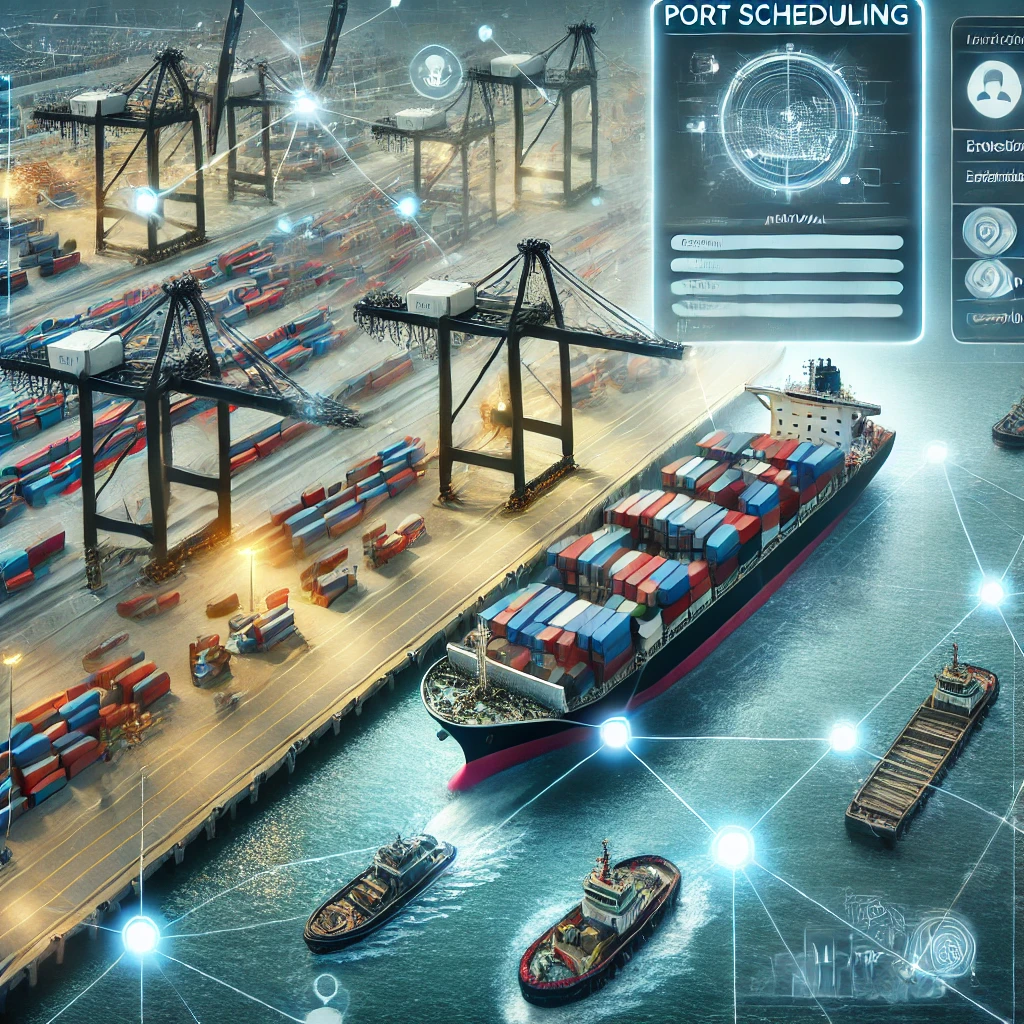Maritime logistics is the lifeblood of global trade, with millions of tons of cargo being transported across the world’s oceans every day. The sea-side operations of maritime logistics present a unique set of challenges, from optimizing vessel routing and fuel consumption to ensuring timely and safe passage through congested and often dangerous waters. In this blog post, we will explore some of the critical operations research problems faced by maritime logistics companies and how Predictim Globe’s advanced AI-based prescriptive analytics solutions are revolutionizing these operations.
Vessel Routing Optimization
Problem Description: Vessel routing is one of the most complex challenges in maritime logistics. Shipping companies must determine the most efficient routes that minimize fuel consumption, avoid congested areas, and meet strict delivery schedules. Traditional routing methods often fall short when faced with the dynamic conditions at sea, such as changing weather patterns, traffic congestion in busy shipping lanes, and unexpected delays.
Solution by Predictim Globe:
Predictim Globe’s AI-powered prescriptive analytics solutions leverage real-time data, including weather forecasts, ocean currents, and port schedules, to optimize vessel routes. By analyzing this data, the AI models can predict potential disruptions and suggest alternative routes that reduce fuel consumption and ensure timely arrivals. The solution continuously learns from past voyages, refining its predictions and recommendations over time.

Fuel Consumption and Emission Control
Problem Description: Fuel consumption is a major cost driver for maritime operations and also has significant environmental implications. With the introduction of stringent emission regulations, shipping companies must find ways to reduce fuel consumption while adhering to these standards. The challenge lies in balancing fuel efficiency with the need to maintain schedules and safety standards.
Solution by Predictim Globe:
Predictim Globe’s AI-based prescriptive analytics solutions offer fuel optimization by analyzing various factors, including engine performance, weather conditions, and route efficiency. The system provides recommendations on optimal speed and engine settings, helping to reduce fuel consumption and emissions without compromising safety or schedules. Additionally, the solution tracks emission levels, ensuring compliance with international regulations.

Crew Scheduling and Safety Management
Problem Description: Efficient crew scheduling is crucial for maintaining the operational efficiency of vessels while ensuring the safety and well-being of the crew. The challenge is to manage crew shifts in a way that adheres to legal work-hour restrictions, minimizes fatigue, and ensures that critical tasks are always covered.
Solution by Predictim Globe:
Predictim Globe’s AI-powered prescriptive analytics solutions optimize crew scheduling by considering various factors such as legal requirements, individual crew member capabilities, and predicted workload based on the voyage plan. The solution ensures that crew members are assigned to tasks that match their skills while minimizing fatigue and enhancing overall safety. It also provides real-time monitoring of crew health and safety, alerting the captain to any potential issues before they become critical.

Risk Management and Incident Response
Problem Description: The unpredictable nature of the sea introduces numerous risks, from equipment failures to collisions and piracy. Maritime logistics companies must be prepared to manage these risks effectively to protect their assets, cargo, and crew. Traditional risk management strategies often rely on reactive measures, which can lead to significant losses.
Solution by Predictim Globe:
Predictim Globe’s AI-based prescriptive analytics solutions enhance risk management by predicting potential incidents and recommending proactive measures to mitigate them. The system analyzes historical data, real-time sensor inputs, and external factors such as piracy reports and geopolitical tensions to provide early warnings. In the event of an incident, the solution offers optimized response strategies to minimize damage and ensure the safety of the crew and cargo.

Port Scheduling and Coordination
Problem Description: Coordinating the arrival of vessels with port schedules is a complex task that involves managing berth availability, cargo handling resources, and minimizing waiting times. Delays in port scheduling can lead to increased operational costs and disruptions in the supply chain.
Solution by Predictim Globe:
Predictim Globe’s AI-powered prescriptive analytics solutions streamline port scheduling by predicting optimal arrival times and coordinating with port authorities in real-time. The solution considers factors such as port congestion, berth availability, and cargo handling efficiency to ensure that vessels arrive at the right time, reducing idle time and improving overall efficiency.

Conclusion
Maritime logistics on the sea side presents a unique set of challenges that require sophisticated solutions. Predictim Globe’s AI-powered prescriptive analytics solutions offer innovative ways to address these challenges, from optimizing vessel routing and fuel consumption to enhancing crew safety and managing risks. By leveraging advanced analytics, maritime logistics companies can navigate the complexities of global trade more efficiently, ensuring safety, profitability, and sustainability.
As the maritime industry continues to evolve, the role of advanced analytics will only become more crucial. Companies that adopt these innovative solutions will be well-positioned to stay ahead of the curve and meet the growing demands of global trade.





